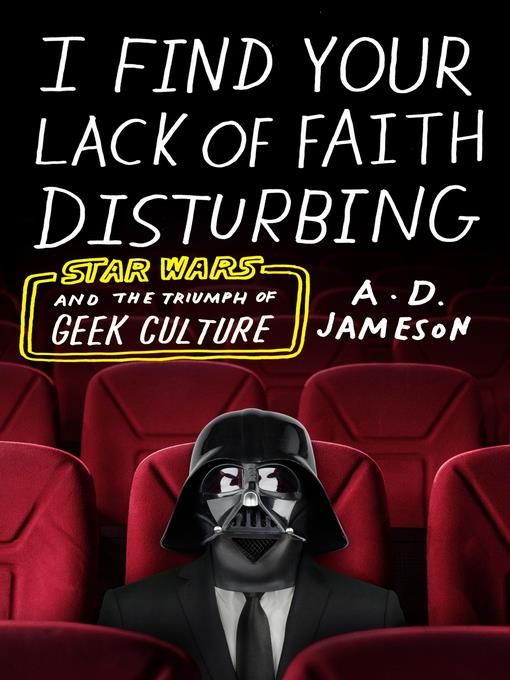
I Find Your Lack of Faith Disturbing
Star Wars and the Triumph of Geek Culture
- اطلاعات
- نقد و بررسی
- دیدگاه کاربران
نقد و بررسی

April 1, 2018
In defense of our new geek overlords. Rather than offering a superfan's love letter to Lucasfilm, Jameson (99 Things to Do When You Have the Time, 2013, etc.) takes aim at the larger trends in entertainment media that Star Wars initiated. Geek art, whether involving sci-fi, fantasy, and/or superheroes, constitutes both a mindset and an aesthetic approach: the creation and consumption of imaginary new worlds with consistent internal logics. The author's mission is not simply to tell the story of how a series of "geek milestones"--like The Matrix or the liberation of superheroes from the dustbin of 1960s comics--transformed once-isolated interests into mainstream blockbusters. He wants us to stop scoffing at video games, sci-fi novels, comic books, collectible figurines, gamer culture, and superhero movies and to re-evaluate them as legitimate, complex, uplifting, and profound art forms (with the corollary that we also hail the rise of nerdcentric movies as the latest generation of great American cinema). Jameson takes umbrage at decades of uptight movie reviewers who have dismissed the undeniable popularity of Star Wars, especially those who accused George Lucas of irrevocably skewing the entire film industry toward such childish pleasures as outlandish storylines and happy endings. The author rejects the dichotomy between realism and fantasy, arguing that Lucas showed how the exploits of aliens in a far-flung galaxy can be just as detailed and realistic as the grittiest new Hollywood flick. Jameson rhapsodizes about his analog adolescence and the uphill-both-ways struggle that was pre-internet geekdom, but his college essay-level arguments won't win over those who sneer at the latest Marvel miniseries or balk at adult board games. Indeed, the book would probably most appeal to the group for which it is not written--i.e., his fellow fanatics, who probably know this stuff already but can never get enough.A book that might prove useful to fellow gen-Xers who find themselves outside geek culture or those who have resisted the force of fantasy all these years but who now wish to learn what all the phantom menace is about.
COPYRIGHT(2018) Kirkus Reviews, ALL RIGHTS RESERVED.

May 15, 2018
Despite the mainstream popularity of Star Wars and the Marvel cinematic universe, Jameson (coauthor, Cinemaps) argues that geek culture has not received the recognition it deserves as an art form. Besides simply gravitating toward the genres of sf, fantasy, and horror, Jameson suggests that geeks desire an immersive world that maintains continuity across multiple formats. Geek culture has exploded over the past 20 years, with the growth of the Internet, as barriers to entry have decreased. In order to find success, franchises catering to these audiences must balance their wishes with those of more general audiences. Geek movies have adopted the appearance of a lived-in universe, in which Star Wars' old and broken droids have replaced the shiny facade of previous sf films. One drawback is that Jameson treats his subject as a monolith, not accounting for why certain genres or formats resonate more than others. He also fails to address the prevalence of sexism and racism within the culture. VERDICT Nostalgia is the main appeal of this work, which will find audiences among fans of the documentary The People vs. George Lucas and Ernest Cline's novel Ready Player One.--Chris Wilkes, Tazewell Cty. P.L., VA
Copyright 2018 Library Journal, LLC Used with permission.

April 15, 2018
One glance at the multiplex or TV lineup will confirm that the geeky have inherited the Earth, but as Jameson observes in this lively volume, it wasn't always so. Back when Star Wars, the progenitor of today's geek renaissance, debuted in 1977, it was wildly popular but not considered highbrow in the way other hits of the era were. A child of the 1980s, Jameson grew up at a time when being a genre fan was something one kept hidden or shared only with like-minded friends. Jameson makes a passionate argument for the depth of these no-longer-fringe entertainments, pointing out the realism within the fantasy and how sf, fantasy, and superhero tales tackle issues personal and political. Genre currently rules supreme, with the Marvel, Star Wars, and Lord of the Rings cinematic universes doing big business at the box office, yet Jameson points out that this isn't necessarily a boon for geeks, who obsess over the minutiae of their beloved franchises. A thoroughly engaging and enjoyable look at the evolution of geek culture over the past four decades.(Reprinted with permission of Booklist, copyright 2018, American Library Association.)




دیدگاه کاربران